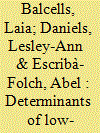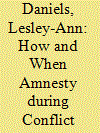|
|
|
Sort Order |
|
|
|
Items / Page
|
|
|
|
|
|
|
| Srl | Item |
| 1 |
ID:
143322


|
|
|
|
|
| Summary/Abstract |
What accounts for low-intensity intergroup violence? This article explores the determinants of low-intensity sectarian violence in Northern Ireland, which has marked the post-1998 peace agreement period. Low-intensity violence comprises a variety of events from riots to attacks against other civilians as well as against homes and symbolic buildings such as churches. We argue that this violence is more likely and prevalent in interface areas where similarly sized rival communities are geographically in contact with each other. Parity and contact spur intergroup competition and threat perception, and they increase the viability of violence. We use original cross-sectional time-series violence data for the 2005–12 period at a disaggregated subnational level, the ward, and a wide variety of social and economic indicators to test our hypotheses. In particular, we assess the impact of within-ward ethnic composition, on the one hand, and the ethnic composition of neighboring wards, on the other. We find that the number of intergroup violent events peaks in wards where there is parity between groups, and in predominantly Catholic (Protestant) wards that border predominantly Protestant (Catholic) wards. The article makes two main contributions: it shows that micro-level dynamics of violence can expand beyond local territorial units, and it suggests that ethnic segregation is unlikely to prevent intergroup violence.
|
|
|
|
|
|
|
|
|
|
|
|
|
|
|
|
| 2 |
ID:
175333


|
|
|
|
|
| Summary/Abstract |
n the difficult process of ending civil wars, granting amnesty during conflict is seen as a useful option, with an underpinning assumption that trading justice for peace is effective. However, is the case? This article tries to bring some clarity to when and how amnesty given during conflict has an impact. Amnesty should have different effects on diverse conflict endings: negotiated settlement, rebel victory, government victory, or conflict reduction. The article also disaggregates amnesties to test direct impacts as an incentive or through reducing the commitment problem, and indirect effects that give military advantage to the government. Using a cross-national data set of amnesties in dyadic conflicts from 1975 to 2011, the research finds that amnesty’s strongest effect is, surprisingly, not as an incentive but rather to reduce commitment problems. It can lead to negotiated settlements but also to government military advantage. The results have implications for negotiations and conflict resolution.
|
|
|
|
|
|
|
|
|
|
|
|
|
|
|
|
| 3 |
ID:
163324


|
|
|
|
|
| Summary/Abstract |
This article argues against the common view that the International Criminal Court (ICC) prevents peace since rebels will not accept accountability. In the presence of an international criminal authority, accountability may be unavoidable. This is true for rebels, but also for state agents. Should the government renege on agreed provisions, it risks ICC attention on its own actors, including into the future. In this way, the ICC functions as a permanent third-party guarantor of the provisions and reduces the commitment problem for the rebels, conditional on certain circumstances. A case study of Colombia finds support for the theoretical proposals.
|
|
|
|
|
|
|
|
|
|
|
|
|
|
|
|
|
|
|
|
|